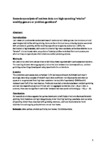Secondary analysis of loot box data: Are high-spending “whales” wealthy gamers or problem gamblers?
| dc.contributor.author | Close, James | |
| dc.contributor.author | Spicer, Stuart | |
| dc.contributor.author | Nicklin, LL | |
| dc.contributor.author | Uther, M | |
| dc.contributor.author | Lloyd, J | |
| dc.contributor.author | Lloyd, Helen | |
| dc.date.accessioned | 2021-07-27T10:38:44Z | |
| dc.date.issued | 2021-06 | |
| dc.identifier.issn | 0306-4603 | |
| dc.identifier.issn | 1873-6327 | |
| dc.identifier.other | 106851 | |
| dc.identifier.uri | http://hdl.handle.net/10026.1/17377 | |
| dc.description.abstract |
INTRODUCTION: Loot boxes are purchasable randomised reward mechanisms in video games. Due to structural and psychological similarities with gambling, there are fears that loot box purchasing may be associated with problematic gambling. Whilst monthly expenditure is typically modest (i.e. < $20), the distribution is highly skewed, with a small number of high-level spenders, sometimes referred to as "whales". It is not known what proportion of industry profits are derived from such players, and whether they are typically wealthy individuals and/or problem gamblers. METHODS: We used structured literature searches to identify surveys of gamers with open-access loot box data. The resulting datasets were aggregated, and correlations between loot box expenditure, problem gambling and earnings investigated using Spearman's rho correlations. RESULTS: The combined open-access data comprised 7,767 loot box purchasers (5,933 with self-report earnings). Secondary analysis of this self-report data confirmed that disproportionate revenue appears to be generated from high-level spenders: the top 5% of spenders (> $100/month) represent half of loot box revenue. Previously reported correlations between problem gambling and loot box expenditure were confirmed, with an aggregate correlation of ρ = 0.34, p < .001. In contrast, there was no significant correlation between loot box spend and earnings ρ = 0.02, p = .10. CONCLUSION: Our secondary analysis suggests that games developers (unwittingly or not) are disproportionately profiting from moderate and high-risk gamblers, rather than high earning customers. Such patterns of spending mirror those observed with gambling revenues, and have implications for harm minimisation and ongoing policy debates around loot boxes. | |
| dc.format.extent | 106851-106851 | |
| dc.format.medium | Print-Electronic | |
| dc.language | en | |
| dc.language.iso | en | |
| dc.publisher | Elsevier | |
| dc.subject | Video games | |
| dc.subject | Problem gambling | |
| dc.subject | Loot boxes | |
| dc.title | Secondary analysis of loot box data: Are high-spending “whales” wealthy gamers or problem gamblers? | |
| dc.type | journal-article | |
| dc.type | Journal Article | |
| dc.type | Research Support, Non-U.S. Gov't | |
| plymouth.author-url | https://www.webofscience.com/api/gateway?GWVersion=2&SrcApp=PARTNER_APP&SrcAuth=LinksAMR&KeyUT=WOS:000629262900001&DestLinkType=FullRecord&DestApp=ALL_WOS&UsrCustomerID=11bb513d99f797142bcfeffcc58ea008 | |
| plymouth.volume | 117 | |
| plymouth.publication-status | Published | |
| plymouth.journal | Addictive Behaviors | |
| dc.identifier.doi | 10.1016/j.addbeh.2021.106851 | |
| plymouth.organisational-group | /Plymouth | |
| plymouth.organisational-group | /Plymouth/Faculty of Health | |
| plymouth.organisational-group | /Plymouth/Faculty of Health/Peninsula Medical School | |
| plymouth.organisational-group | /Plymouth/Faculty of Health/School of Psychology | |
| plymouth.organisational-group | /Plymouth/REF 2021 Researchers by UoA | |
| plymouth.organisational-group | /Plymouth/REF 2021 Researchers by UoA/UoA04 Psychology, Psychiatry and Neuroscience | |
| plymouth.organisational-group | /Plymouth/Research Groups | |
| plymouth.organisational-group | /Plymouth/Research Groups/FoH - Community and Primary Care | |
| plymouth.organisational-group | /Plymouth/Research Groups/Institute of Health and Community | |
| plymouth.organisational-group | /Plymouth/Research Groups/Institute of Translational and Stratified Medicine (ITSMED) | |
| plymouth.organisational-group | /Plymouth/Research Groups/Institute of Translational and Stratified Medicine (ITSMED)/CCT&PS | |
| plymouth.organisational-group | /Plymouth/Research Groups/Plymouth Institute of Health and Care Research (PIHR) | |
| plymouth.organisational-group | /Plymouth/Users by role | |
| plymouth.organisational-group | /Plymouth/Users by role/Academics | |
| dc.publisher.place | England | |
| dcterms.dateAccepted | 2021-01-26 | |
| dc.rights.embargodate | 2022-8-3 | |
| dc.identifier.eissn | 1873-6327 | |
| dc.rights.embargoperiod | Not known | |
| rioxxterms.versionofrecord | 10.1016/j.addbeh.2021.106851 | |
| rioxxterms.licenseref.uri | http://www.rioxx.net/licenses/all-rights-reserved | |
| rioxxterms.licenseref.startdate | 2021-06 | |
| rioxxterms.type | Journal Article/Review |


